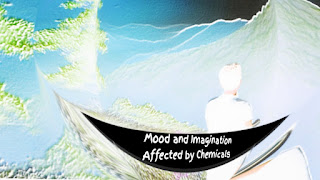Learning about chemicals can be enriched by imagination. But, it's fascinating how chemicals play a great role to nurture imagination in learning. Learning and creativity can be impacted by the quality of mood and general mental function as well as body well-being.
The biochemical function aspect of the human and other living things is governed by hormones that act as chemicals occurring naturally in our bodies. The hormones coordinate body functions by taking messages through the blood to organs, tissues, skin, muscles, and so on. The messages signal the body to function properly.
Think of chemicals found in foods we eat. Chemicals in the products we consume from toothpaste, cosmetics, medicine, drugs, etc, it's chemicals around us not only affecting our physical world but also our minds.
From Serotonin to Phenethylamine, Dopamine, and Oxytocin. The chemicals for a good mood and creative mind alter how we behave and feel on daily basis. They are hormones that ensure the proper function of our bodies and brains. They contribute to mental health and the body.
Dopamine specifically acts as a particularly important hormone in the creative process. It is the chemical that lets our brain imagine and stimulates the sense of imagination that cooks up new concepts.
Physical world chemicals are the chemicals found in our surroundings, they are chemical compounds or chemical elements found in water, food, air, soil, dust, and other environmental conditions as well as consumer products.
The chemicals in nature come as natural substances. From organic compounds occurring in the forms of simple and complex combinations of carbon, hydrogen, and oxygen to inorganic compounds produced in the industry processes and so on.
The emotional quality of our minds is associated with the influence of chemicals that occur naturally in our bodies as hormones. These chemicals affect how we behave and go about with our daily needs of mind and body well-being.
We need to be happy every day and feel good. The chemicals in our body and brain contribute largely to the perception of this quality of happiness and attitude of optimism.
The chemicals and hormones affect our imagination and creativity. They contribute to how we feel every day. From swing moods to highly elevated moods and feelings of quality of satisfaction.
We encounter chemicals naturally by interacting with animals, and plants. Also, chemicals can be found in food, water Soil, and dust.
Air in the atmosphere may affect human mood negatively or positively. The air we breathe may have bacteria, fungi, or pollen that affect mood and cause allergic reactions.
On the other hand, some chemicals may have antioxidant and anti-inflammatory properties as they can act as essential micronutrients. They may help to fight cancers, autoimmune conditions, neurodegenerative diseases such as dementia, and psychotic conditions such as depression.
Chemicals do alter Mood, Improve and Affect Imagination.
- Studies show that a bacteria called m.vaccae found in the soil activate the body to produce chemicals. The chemicals influence the mind by turning on the body to produce the feel-good hormone serotonin, which improves immunity and mood.
- The hormone serotonin occurs naturally in various species of plants, thus we emotionally benefit from plants. When we work in gardens and farms we get exposed to this bio-chemical that controls mood, sleep, and anxiety in mammals. We can experience better imagination when in good mood.
- Exposure to chemicals in the air contributes to psychiatric disorders such as cognitive deterioration, dementia, depression, anxiety, and even suicide. Imagination and productivity can be affected negatively by harmful chemicals.
- Exposure to water bodies such as rivers, lakes, and so on, and bathing in forestry places improve mood by reducing cortisol. Cortisol is a stress hormone that is heightened when the body is dehydrated. Also, hydration improves mood and reduces stress by activating the body to produce dopamine and serotonin. Thereby, this enhances the quality of imagination and creativity in daily activities.
In conclusion, chemicals are everywhere around us. We interact with chemicals daily as we go about our regular activities.
However harmful chemicals nowadays are everywhere, contributing to most diseases. We need to imagine and dream better by working in our gardens, walking and bathing in nature, and eating natural foods.
And lastly getting hydrated to keep that good mood and creativity, and happiness free from anxiety and stress attributed to harmful chemicals.
References
Lieberman, Daniel Z. and Long, Michael E., "The Molecule of More: How a Single Chemical in Your Brain Drives Love, Sex, and Creativity--and Will Determine the Fate of the Human Race" (2018). Faculty Bookshelf. 249.
https://hsrc.himmelfarb.gwu.edu/books/249
C.A. Lowry, J.H. Hollis, A. de Vries, B. Pan, L.R. Brunet, J.R.F. Hunt, J.F.R. Paton, E. van Kampen, D.M. Knight, A.K. Evans, G.A.W. Rook, S.L. Lightman, Identification of an immune-responsive mesolimbocortical serotonergic system: Potential role in the regulation of emotional behavior, Neuroscience, Volume 146, Issue 2,2007, Pages 756-772, ISSN 0306-4522,
https://doi.org/10.1016/j.neuroscience.2007.01.067.
Weitekamp, C.A., Hofmann, H.A. Effects of air pollution exposure on social behavior: a synthesis and call for research. Environ Health 20, 72 (2021). https://doi.org/10.1186/s12940-021-00761-8
Ramakrishna, A., Giridhar, P., & Ravishankar, G. A. (2011). Phytoserotonin: a review. Plant signaling & behavior, 6(6), 800–809. https://doi.org/10.4161/psb.6.6.15242




Thank you for reading!